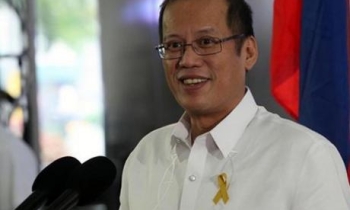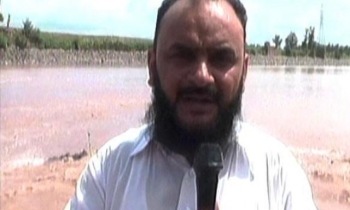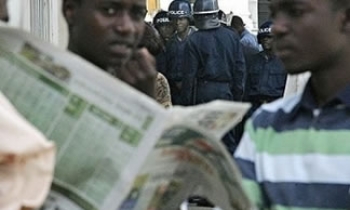CARACAS, Venezuela -- In the 1990s, Venezuelan journalist José Vicente Rangel hosted a television talk show whose aggressive style and muckraking led to the downfall of President Carlos Andrés Pérez. Now, after eight years as President Hugo Chávez's deputy, Rangel is back on television, interviewing and breaking news on "José Vicente Today."
But instead of airing the bare-knuckles journalism for which he was once known, Rangel's program on privately owned Televen is decidedly supportive of many of Chávez's policies. Rangel has even defended Chávez's decision not to renew the license of an influential and stridently anti-government television station, RCTV, which will go off the air Sunday just before midnight.
"It's up to the state to renew or not renew," Rangel, 77, who was vice president until January, said in an interview. "This is not an issue of freedom of expression. The issue is the sovereignty of the state."
Among Venezuelan broadcasters, Rangel is not alone in his support of the president's move, even though it has been condemned by international press freedom groups. The reason, government critics say, is clear: Chávez increasingly controls what gets printed and aired here, regardless of whether a media outlet is private or public.
Buffeted by harsh coverage in its first four years, the government has made amplification of its voice a cornerstone of its communications strategy in the past four years. The new reality is a far cry from 2002, when the biggest papers and television stations supported an opposition movement through a coup and a national strike intended to dislodge Chávez from power.
Outlets, particularly television stations, that were once aggressively anti-government have grown docile under threat of sanctions, say press freedom and human rights groups, while the government has used a windfall in oil revenue to start up newspapers and broadcast networks.
"In 2002, you had highly critical media, four private television stations and a state media apparatus that was very weak," said Carlos Lauría, an Argentine journalist who led a delegation that studied the RCTV case for the New York-based Committee to Protect Journalists. "Now, you have a state communications apparatus that is much stronger, with heavy propaganda and media outlets that echo each other."
The government has upgraded equipment and expanded the staff of the state television station, Venezolana de Television, or VTV. It has founded three other television stations, including Telesur, which broadcasts across Latin America, and about 200 community radio and television stations. It controls or influences dozens of Web sites and, through government advertising, has won backing from established outlets.
Telecommunications Minister Jesse Chacón said the idea is to "democratize" the media, which Chávez officials have complained are in the hands of faceless corporations that care little about social conditions in Venezuela. He said that in 2000, just a year into Chávez's presidency, there were virtually no community radio and television stations.
"A new sector has been born that didn't exist before in Venezuela," Chacón said in an interview with Rangel at Televen's studios.
The campaign is crucial because the government is trying to rapidly transform Venezuela into a socialist state, a path that officials say requires the support of the people. The effort includes all manner of programming, from local homespun talk shows to cultural affairs programs to documentaries -- the kind of programming that even critics of the government say is healthy for a democracy.
But critics also see what they call drone-like coverage of the government on the state's main station, VTV. A European Union study of VTV's coverage of December's presidential election found that the vast majority of the political coverage focused on the government and was overwhelmingly positive.
To critics, the most controversial program is "The Razor," a late-night show in which the host, Mario Silva, wears pro-government T-shirts and caps and sits in front of a giant photograph of Fidel Castro and Ernesto "Che" Guevara. He lambastes the opposition and Americans and frequently discloses "news" of counterrevolutionary efforts aimed at toppling Chávez.
Two and a half years ago, Venezuela passed a law stipulating that the news media cannot put out reports that endanger national security or incite disruption of public order. The criminal code was also amended so that insulting authorities became a crime.
Those regulations, and Chávez's frequent attacks on the media, have prompted Televen, which airs "José Vicente Today," to tone down its coverage sharply. Meanwhile, other stations that were once critical of the government have also shifted tone.
In television broadcasting, only Globovision, a 24-hour cable station seen in the Caracas area, and RCTV have remained hard-charging government opponents.
Tough, independent radio stations, such as Union Radio in Caracas, still broadcast. And influential newspapers such as El Universal and El Nacional continue to investigate the government, unraveling stories about bloated bureaucracy and official incompetence. The government says that independence is proof that the state is not trying to censor coverage.
"These papers continue to operate," Chacón said. "No one has shut them down. They cannot point to a closed medium or a closed newspaper or a journalist detained."
The non-renewal of RCTV's license, though, has generated charges of political censorship. For months, Chávez and other government officials disparaged RCTV's news coverage and its role in the failed coup, in which the station provided positive coverage of an anti-Chávez movement that unseated the president for two days and then ignored his return to power in a popular uprising.
Yet the state has not filed rebellion charges against RCTV's leaders. Government officials have begun to talk of a series of violations of telecommunications regulations and decency rules. But the Committee to Protect Journalists said the station was never officially sanctioned for any of the supposed violations, let alone permitted to defend itself in hearings.
"Those accusations were used as a pretext by the government to back a clearly politically motivated decision," Lauría said. "Otherwise, you're just accusing them. But where's the proof?"
Lauría said the criteria used by authorities to not renew the license are ambiguous. He said other stations could also be accused of purported violations, such as airing racy programming during daylight hours. But even though their licenses also expire Sunday night, he said, the government is not expected to move against them.
On his program, Rangel, the former government official, invites mostly government officials. But he said that he is no stooge for the state. He explained that he has also invited opposition figures and has been steadfast in his condemnation of crime and government corruption.
"I'm not with the government, but I'm with the process, but that doesn't mean I cannot criticize," he said. "I'm free to say whatever I want, within certain parameters."









